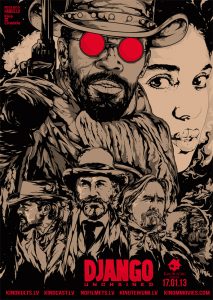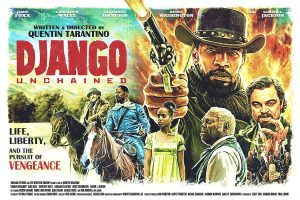Neither Black nor White:
A Morally Gray Identity as a Form of Resistance and Justice in Django Unchained (2012)
by Selis Yıldız Şen

Revolving around the idea of freedom and the presentation of the problematics of the discrimination and exploitation, Quentin Tarantino’s Django Unchained contains within itself many layers of meaning. The film’s approach on racial inequality results in creating a dreary image of the slavery. However, this depressing element in such a depiction is weakened through the presence of the main characters Django and Dr. King Shultz.
The fall of Django as a slave and his rise as a free man cannot be considered separately from the presence of Dr. King Shultz. It is by virtue of Dr. King Shultz that Django is saved. Django’s journey to freedom, on the other hand, is not the main concern of the narrative, but it is a necessary step in the main character’s road to finding his lost wife and fulfilling vengeance towards those who wronged him in the past. Django’s rescue which is made to happen by Dr. King Shultz is a significant point in the construction and finalization of Django as a character who unconventionally embodies certain virtues and vices within himself. This, and the fact that he consequently chooses to become Shultz’s partner as a bounty hunter put Django in a gray area of moral position. Dr. King Shultz, on the other hand, the rescuer of Django and the seemingly heroic yet again, morally gray character of the narrative, promises almost a sense of relief in this narrative of the struggle between the oppressor and the oppressed. In a world where the black is oppressed by the white, Dr. King Shultz, a white man who teams up with a black man, immediately creates a conflict between the conventional positionings that constitute the aforementioned categorizations. In this case, Dr. King Shultz and Django both appear to be characters who are the bearers of morally gray values in a world where every other person seems either on the black or white side. Both Django and Dr. King Shultz offer an opposition to a world and society shaped up by discriminatory regulations and positionings. On the other hand, both of these characters are motivated not by heroic values but by personal agendas; Django’s sole motivation is to find and save his wife and Dr. Shultz’s motivation is to make a profitable living. However, this does not change the fact that both of these characters are not, in the slightest sense, merely made up of the motivations that flame their souls into taking action.
In the end, the world and the society that is presented by Tarantino in Django Unchained is one that is drained from any sense of decency, equality and freedom when it comes to the presence and place of black people in it. Dr. King Shultz and more especially, Django, are morally gray anti-heroes who defy the set morals and regulations of a system that is built on the exploitation of black people, offering a sense of relief and a beam of light in a portrayal of such a lightless world of fiction.

